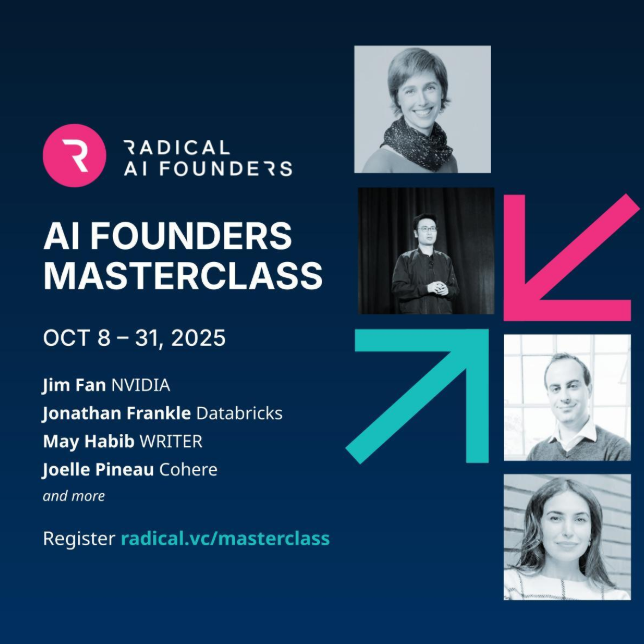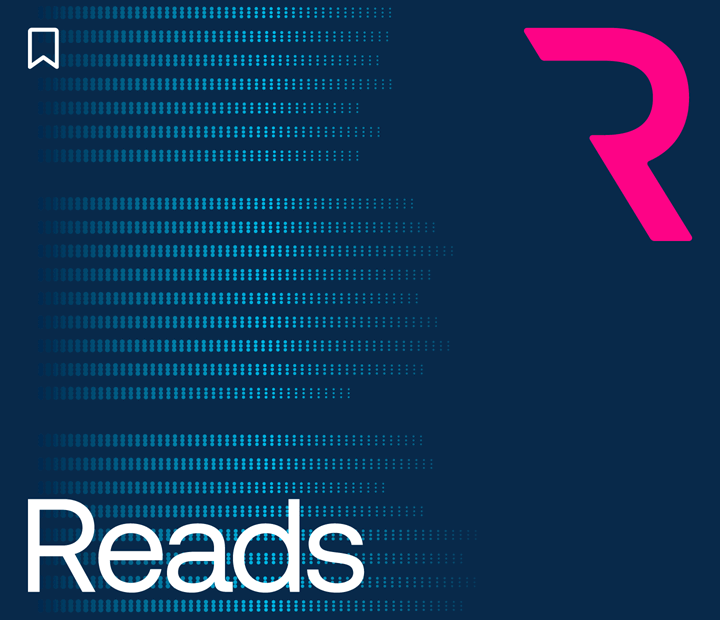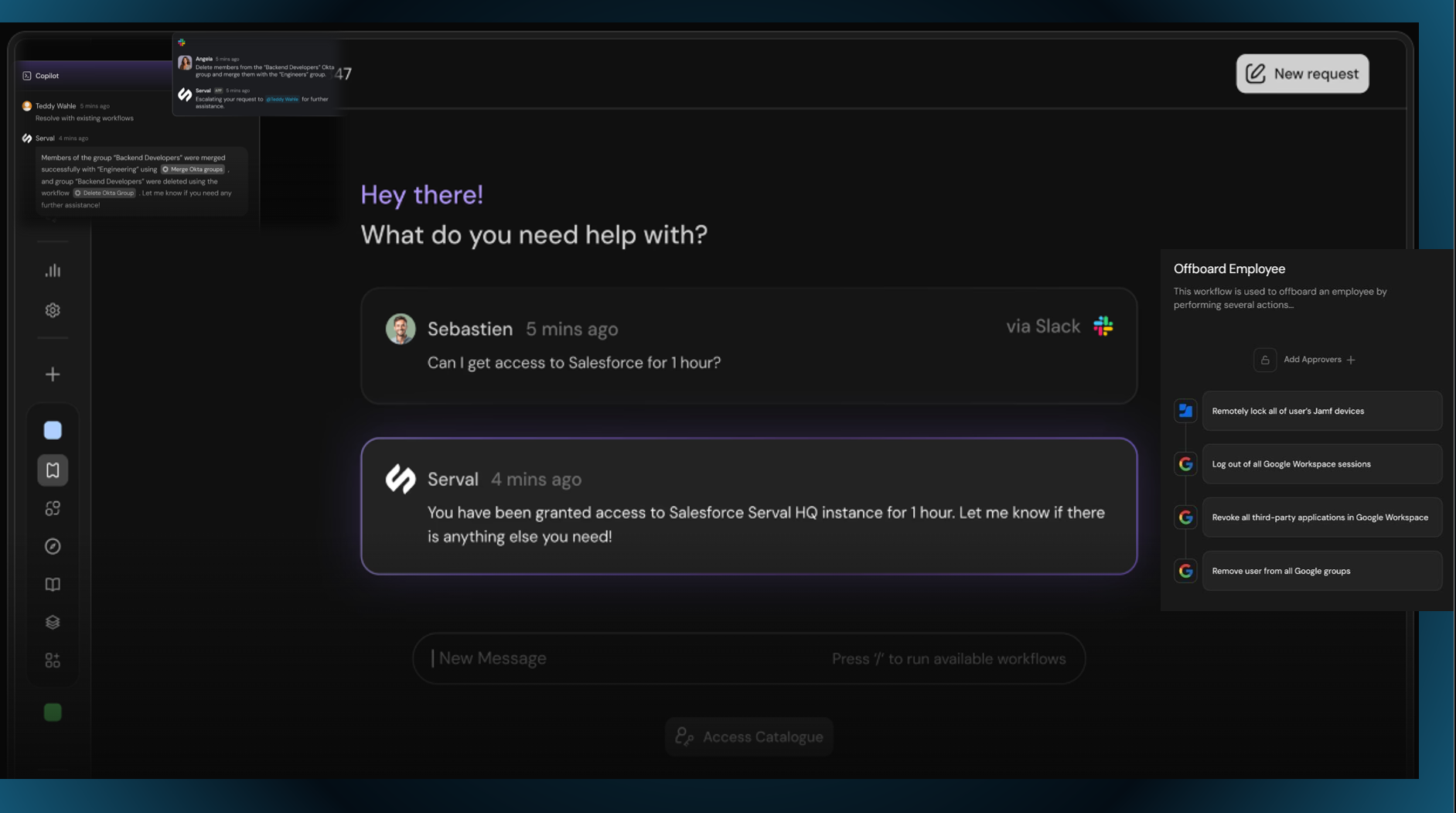The Radical Ventures AI Founders Masterclass is an exclusive annual program designed to equip AI researchers and technical entrepreneurs with the inspiration and practical knowledge to build AI products and businesses. Over four weeks, we host virtual, free sessions with world-leading AI pioneers, successful entrepreneurs, and leaders from top AI companies, complemented by tactical sessions covering AI product development, business integration strategies, and other essential areas that AI founders need to master.
Our 2025 Masterclass kicks off on October 8 and will feature prominent AI leaders Jim Fan (NVIDIA), Jonathan Frankle (Databricks), May Habib (WRITER) and Joelle Pineau (Cohere) — alongside tactical sessions focused on building an AI business from the ground up.
Sessions are only open to Masterclass participants, and applications are open until the end of the month. Register here: https://radical.vc/masterclass/
AI News This Week
-
What Exactly Are A.I. Companies Trying to Build? Here’s a Guide. (NYT)
Tech giants Amazon, Microsoft, Google, Meta, and OpenAI plan to spend at least $325 billion by the end of 2025 on AI infrastructure and development. Driving this investment are product innovations aimed at building everything from search engines, productivity tools, programming assistants and the software powering smart glasses. The most ambitious goals include using AI for scientific breakthroughs, with some AI pioneers predicting that AI could cure cancer and double human lifespan to 150 years within a decade. Finally, additional demands on infrastructure are tied to frontier model companies pursuing artificial general intelligence (AGI) or superintelligence.
-
Stealth AI Sales Startup Spara Raised $15 Million After Refining Its Idea With 'Really Smart People' (Business Insider)
Radical Ventures portfolio company Spara has emerged from stealth with $15 million in funding to automate inbound sales processes. Co-founded by CEO David Walker and CTO Zander Pease, Spara builds conversational AI agents for voice, chat, and email that greet prospects, qualify leads, and book meetings. The founders spent six months interviewing over 200 sales leaders before settling on their concept, with many of these contacts becoming investors. Spara focuses specifically on inbound sales, arguing that “outbound is dead and AI is killing it” due to the saturation of automation.
-
AI Models Must Adapt or Die as Scaling Hits Diminishing Returns (Financial Times)
The AI industry faces diminishing returns from traditional scaling as high-quality training data becomes scarce. Critics argue current models are “souped-up regurgitation machines” that won’t achieve AGI through more compute alone. Researchers now advocate for “active inference” systems that adapt through real-world interaction rather than processing historical data. Reinforcement learning pioneer Rich Sutton argues AI must shift toward experience-driven learning, as available high-quality data has been largely consumed.
-
A New AI Model can Forecast a Person's Risk of Diseases Across their Lives (The Economist)
Researchers have developed Delphi-2M, an AI model that can predict which of more than 1,000 medical conditions a person might develop in the future. The model takes inspiration from large language models like GPT, but instead of predicting the next word in a sentence, it predicts the next diagnosis in a patient’s medical history. A key innovation was teaching the model to account for time between medical events by encoding a person’s age as the timing between diagnoses matters significantly for interpretation.
-
Research: Emergent Hierarchical Reasoning in LLMs Through Reinforcement Learning (Hong Kong University of Science and Technology/University of Waterloo/Tsinghua University/Imperial College London/UCAS)
Researchers have discovered that reinforcement learning improves LLM reasoning through an emergent two-phase hierarchy similar to human cognition’s separation of strategic planning from procedural execution. When training language models with reinforcement learning, the AI first focuses on correctly performing calculations or following procedures at a basic level. Then the learning shifts to a higher-level strategy of deciding which approach to take or how to break down complex problems. This two-phase pattern explains mysterious training phenomena like sudden “breakthrough moments” where performance jumps dramatically. Current training methods waste effort by treating all parts of the AI’s response equally, but the researchers developed HICRA, a new approach that focuses optimization on the strategic planning portions rather than routine execution steps.
Radical Reads is edited by Ebin Tomy (Analyst, Radical Ventures)





